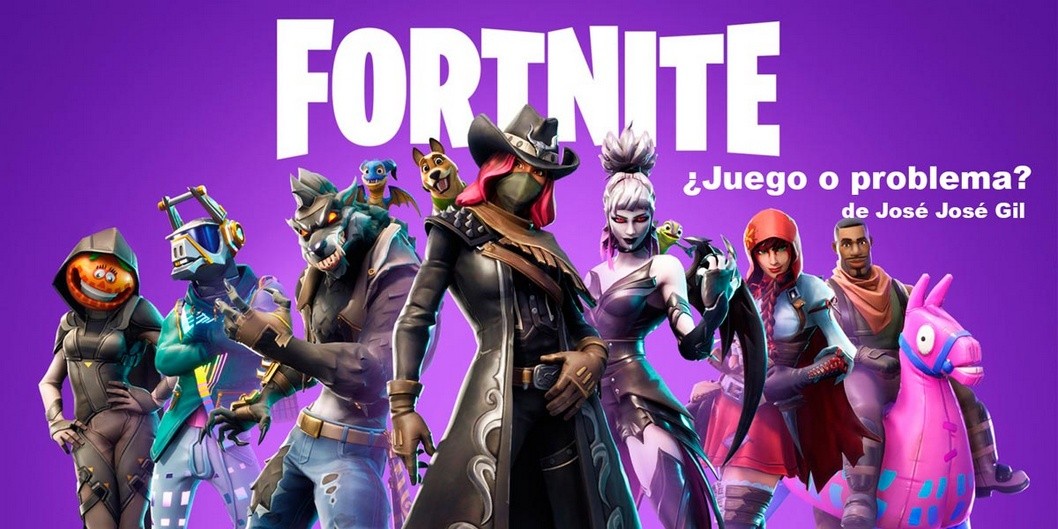Fortnite, ¿juego o problema?

El Fortnite es un juego en el que están registradas 250 millones de personas.
Funciona en cualquier vídeo-consola actual (Play, Wii, Xbox) y en cualquier móvil de última generación.
Su dinámica es sencilla y fácil de aprender: 100 jugadores se meten en una isla y sólo puede quedar uno, mientras la isla cada vez se hace más pequeña.
Como cualquier juego online se puede jugar a cualquier hora en partidas cortas que apenas duran 30 minutos.
El fabricante (Epic Games) considera que aunque es un juego de muerte/eliminación, como no se ve sangre, se puede tener a partir de los 12 años (PEGI 12+).
Es “gratuito”, no te cuesta nada comenzar pero si quieres llevar una ropa más “de moda” (skin) o deseas que tus personajes puedan bailar y mofarse de sus adversarios, aquí si hay que pagar, entre 5 y 20 €. Es donde gana dinero del fabricante.
Después de lo dicho llegamos a las dos conclusiones:
- Como juego y diseño es más bien mediocre.
- Es una fantástica operación de marketing minimalista (gratis, inmediato, en cualquier dispositivo, etc.) sin darle relevancia alguna ni a la historia ni a los gráficos (son dibujos animados).
Entonces me pregunto: ¿Quién es el responsable de que niños cada vez más jóvenes, pasen muchísimas horas enganchados al juego?
¿El menor? - Sólo hace lo que está de moda, y esto le permite socializar, no sólo dentro del juego sino también en el colegio y en la calle, pues puede opinar sobre algo que comparte con muchos de sus iguales.
¿El juego? - Hacer responsable al juego es como responsabilizar a un cuchillo con filo de habernos cortado. Las cosas no tienen ninguna responsabilidad.
¿Los padres? - Los padres sí que somos los responsables al permitir que nuestros hijos jueguen a cualquier cosa. No podemos esperar que el menor haga un uso adulto y responsable del juego, pues ni son adultos ni responsables.
No podemos entregar un arma cargada a un niño y esperar que no se haga daño o haga daño a los demás. Lo primero que debemos saber como padres es lo que es un arma.
Como mínimo, aprendamos con él la utilización de las tecnologías (móvil, videoconsola, etc.), juguemos y disfrutemos de su compañía, pues cuando sean un poco mayores echaremos de menos esos momentos de charla, risas y bromas.
Este artículo también lo podéis encontrar en el blog http://www.adiccionesadolescentes.es
Mi próximo artículo se titulará:
“¿A qué edad le compro el móvil?”
Gracias al trabajo de Sara Cremades González (Maestra y filóloga), podemos tener este artículo en ingles:
Fortnite, game or trouble?
Fortnite is a game within 250 people registered. It works in any of the current video games (Play, Wii, Xbox), in addition to any cutting-edge mobile phone.
Its dynamics are simple and easy to learn: 100 players get into an island and there can be only one at the end, while the island gets each time smaller.
Like any online game, you can play at any hour in short matches that hardly last 30 minutes.
The maker (Epic Games) considers that, even though it is a death/elimination game, as you do not see any blood, children are allowed to play from 12 years old (PEGI 12+).
It is “free”, you don’t pay at the beginning, but if you wish to play with more “up-to-date” clothes (skin) or you want your characters to dance and make fun of their enemies, you have to pay from 5 to 20€. Here is where the maker earns money.
After what has been said we can conclude the following:
- As game and design it is rather mediocre.
- It is an amazing and minimalist operation of marketing (free, inmediate, available in any dispositive, etc) without any relevance given to the story or the graphics (they are cartoons).
So I ask myself: who is responsible for kids (each time younger) spending a lot of hours hooked on that game?
The minor?.- He only makes what is fashionable, and this allows him to socialize, not only inside the game, but also at school and in the street, since he can give an opinion with his partners.
The game?.- Making the game responsible is like holding a knife responsible for cutting us. Things themselves have no responsibility.
Parents?.- Indeed parents are responsible for allowing their children play to any game. We cannot expect that the minor makes an adult and responsible use of the game, inasmuch they are neither adults nor responsible.
We cannot give a loaded weapon to a child and expect that he does not hurt himself or the others with it. The first thing we need to know as parents is what is a weapon.
At least, lets learn with him the use of new technologies (mobile phone, video game, etc.), lets play with them and enjoy their company, since when they get older we will miss those moments of chatting, laughing and joking.

Soy José José Gil (J.J.), Enfermero experto en las Adicciones de los Adolescentes (Alcohol, Porros, Móvil, etc…).
Trabajo tanto con las Familias como con los Adolescentes; y desde hace hace 12 años escribo el blog: www.adiccionesadolescentes.com

